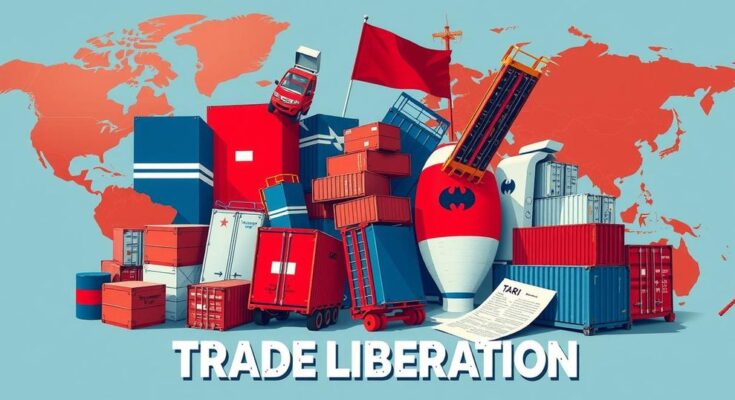President Donald Trump’s administration is set to announce new reciprocal tariffs on April 2, impacting all U.S. trade partners. The tariffs will target countries with high duties on U.S. exports, with immediate effects following the announcement. India and others are preparing for economic repercussions while assessing the potential trade agreement dynamics with the U.S. Significant opposition from allies is anticipated.
On April 2, President Donald Trump’s administration is set to announce new reciprocal tariffs, despite limited details being provided by the White House. This initiative is anticipated to impact all U.S. trade partners, as Trump seeks to address what he deems unfair trade practices. The announcement aims to fulfill his commitment to reform international trade policies that he believes have historically disadvantaged the United States.
White House spokeswoman Karoline Leavitt articulated that the new tariffs will target countries with high duties on U.S. exports and will take effect immediately following the announcement. Notably, a 25% tariff on auto imports is scheduled to be implemented on April 3. The administration is reportedly keen on ensuring that this announcement will be meticulously crafted to optimize its impact.
Countries affected by the impending tariffs, notably India, are taking a cautious approach amidst economic volatility stemming from Trump’s tariff strategy. Leavitt indicated that the specifics of the reciprocal tariffs will be determined by the President himself. India is proactively pursuing a bilateral trade agreement with the United States, despite Trump’s assertions that India will severely reduce its tariffs.
Indian officials are reassessing potential ramifications of the tariffs and are optimistic regarding ongoing trade discussions. Reports indicate that U.S. Treasury Secretary Scott Bessent communicated to Republican lawmakers that the announcement will establish a cap on the tariffs, which may be adjustable depending on the compliance of trade partners with U.S. demands.
According to the Washington Post, the administration is considering a 20% duty increase on products imported from all countries, with projected revenues reaching $6 trillion potentially being allocated as rebates to affected sectors. Additionally, the Wall Street Journal reports that plans are underway for a more selective tariff policy that would not uniformly impose a 20% tariff across the board.
In response, major U.S. allies, including Canada and the European Union, have expressed firm opposition to Trump’s tariffs. Canadian Prime Minister Mark Carney’s office emphasized a commitment to retaliate against these actions, branding them as unjustified. Meanwhile, EU Executive Chief Ursula von der Leyen stated a desire for a negotiated solution while also indicating readiness to protect the interests of European workers and businesses against these trade measures.
In conclusion, the forthcoming announcement of new reciprocal tariffs by President Trump’s administration is poised to initiate significant changes in U.S. trade relations, affecting numerous countries, particularly India. As international partners prepare for potential economic repercussions, the administration’s plans aim to address longstanding trade imbalances. The broader implications of these tariffs remain uncertain as countries evaluate their response strategies amidst this shifting economic landscape.
Original Source: www.hindustantimes.com




